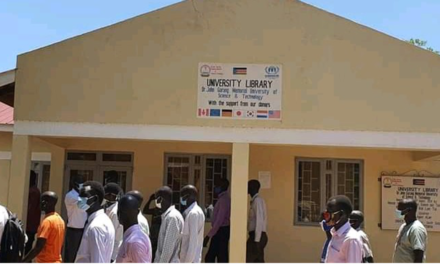
UNGA2023: Gov’t Criminalizes Child Marriage to Keep Girls in School

Poverty, conflict, insecurity, financial barriers, and natural disasters such as floods, and drought have hindered access to education for many young people in South Sudan.
The world’s youngest country has the highest proportion of out-of-school children in the world with 2.8 million children out of school with 53 percent being girls – about 1.484, according to United Nations International Children’s Emergency Funds (UNICEF) and United Nations Educational Scientific and Cultural Organization (UNESCO) 2023 report.
However, while addressing delegates at the 78th UN General Assembly (UNGA) Thursday, President Salva Kiir Mayardit said there have been strides in the education sector in South Sudan.
In February, Kiir directed the Ministry of Education to provide free primary and secondary education across the country.
“This policy has led to the enrollment of 2.3 million children in our schools,” Kiir told the General Assembly.
With technological advancement, developing countries such as South Sudan risk being left behind, which is a cause of concern for the UN.
During the UN Summit on the Least Developed Countries (LDCs) in Doha, Qatar earlier this year, setting an online university as a plan of action to bridge the gap was proposed but for that to be achieved, a foundation such as primary education should be strengthened.
While addressing the summit in March, Rehab Fatima, the UN high representative for LDCs, Small Island Developing States, and Landlocked Developing Countries said, “the education system in the least developed countries require significant development to equip their young people with the skills they need for the future.”
Five months on, there are still concerns regarding education. High-quality education from early childhood through college lays the foundation for career success and financial stability.
While speaking to the UNGA on the International Day to protect education from attack, UN Secretary-General, Antonio Guterres called on countries to boost long-term official development assistance in support of stronger education systems and commit to reaching the target of four percent of global humanitarian funding for education.
“Education represents a pathway to a better future for every person and a more peaceful world. We can and we must protect education from attack,” the UN Chief emphasized.
Key disparities in education systems limit the ability of lower-income students and students from developing nations to achieve financial security over the course of their lives.
The Sustainable Development Goals (SDGs) aim to alleviate people from poverty which involves harnessing the array of resources, capabilities, and institutional support that enable vulnerable families to sustain themselves, thrive, and move up the economic ladder. But for this to be achieved it requires quality education.
The chairperson of the education above all foundation, Her Highness Sheikha Moza Bint Nasser urged that education be redesigned to make learning more accessible.
“We can use technology to bring accelerated learning to all. And if we do so, those millions can achieve so much,” Nasser added.
Key changes to components of education that provide quality academic preparation that put all students on the road to career success and prosperity can increase the chances of countries achieving SDGs.
But for that to be achieved, education must be protected and encouraged at all costs.
“Children everywhere should have access to education and in the context of protecting education, children should go to school without fear of hindrance. Every child must have access to quality and inclusive education,” said Julius Maada Bio, the Sierra Leonean president at the 78th session of the UNGA on International Day to protect education from attack.
In South Sudan, President Kiir pledged to increase the education budget to help pay teachers living wages and criminalize child marriage, which has, for decades led to school dropout and low enrollment of school-going girls.
“To ensure that girls stay in schools, we’ve banned child marriages through an Act in parliament,” President Kiir said.




















Recent Comments